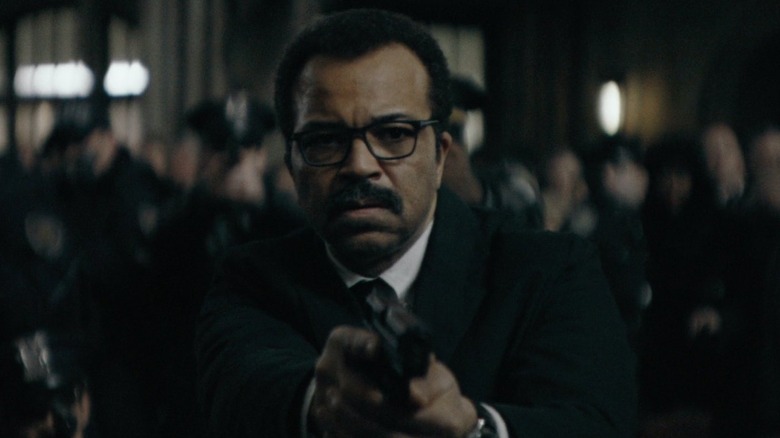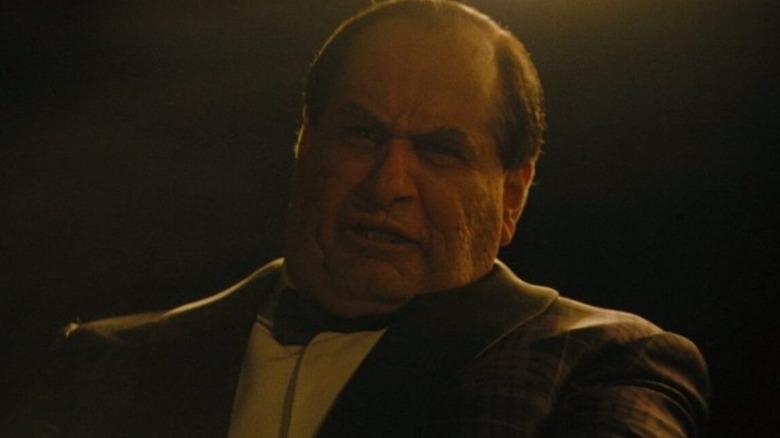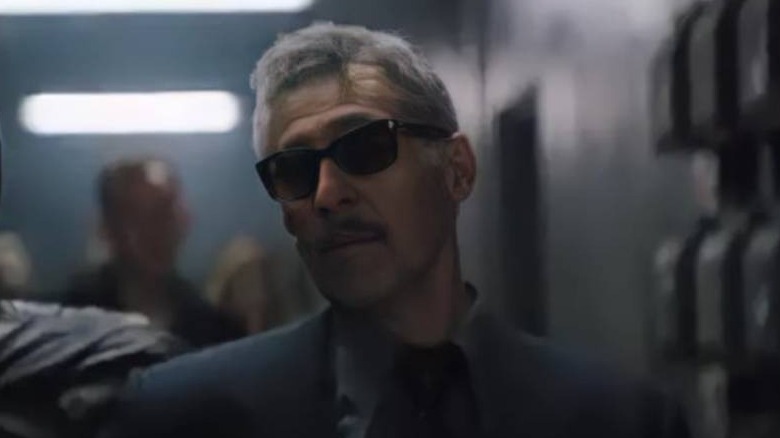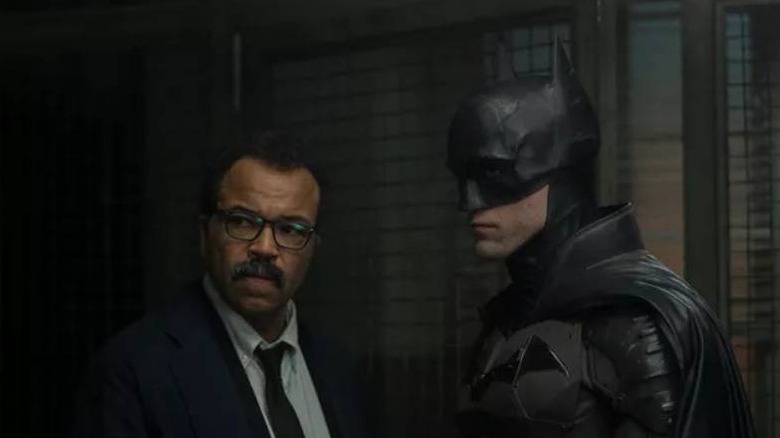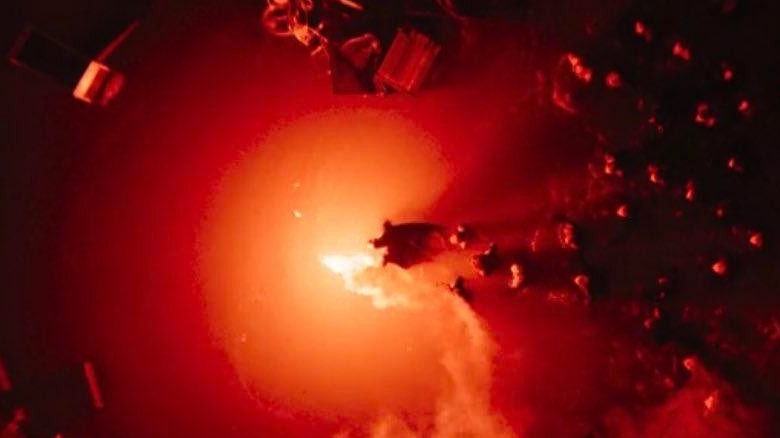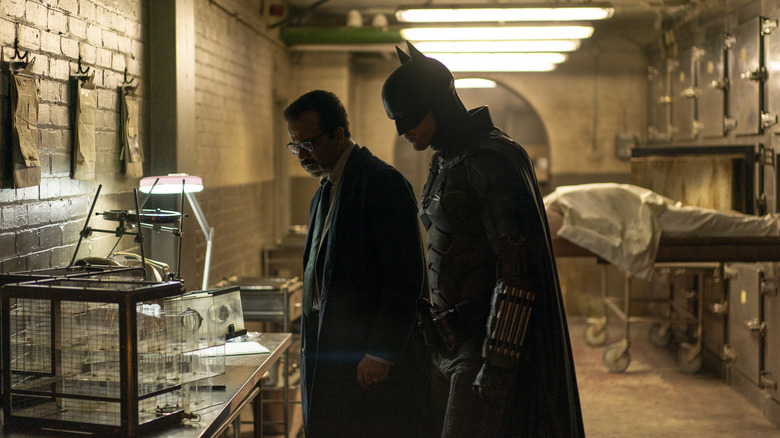5 Moments In The Batman That Prove Jim Gordon Is The Real MVP
"The Batman" is chock full of characters from the Dark Knight's mythos, from Zoe Kravitz's Selina Kyle to Paul Dano's Riddler. However, the standout of them all is Lt. James Gordon, courtesy of Jeffrey Wright's performance Thanks to Jeffrey Wright's world-weary (and often bemused) take on the character — especially when he discovers the Riddler's twisted form of a "thumb drive" — this Gordon may be one of the best yet.
A large part of that is due to the active role that Gordon plays in the film. Next to Batman, he's the character with arguably the most screentime. There's also the fact that Gordon and Batman have a rock-solid partnership — they work the case like any other detectives would, except one of them is clad from head to toe in bat-themed armor. But even without the Caped Crusader around, there are five moments in the film where Gordon manages to prove that he's just as capable as his pointy-eared partner.
"The Batman" spoilers follow.
Interrogating the Penguin
In what may be one of the film's best scenes, Gordon and Batman capture and interrogate the Penguin (Colin Farrell) after Batman engages in a car chase with his Batmobile — or as I've taken to calling it, "The Pattmobile." Both men believe that the Penguin is an informant in the case that helped bring down mob boss Salvatore Maroni and therefore is the Riddler's next target. In a surprising reversal of roles, Batman stands by while Gordon mercilessly interrogates the Penguin. The highlight of the scene features Gordon pulling out a picture of one of the Riddler's victims and forcing the Penguin to look at it; this moment carries extra oomph because it's the former Police Commissioner — who happened to be Gordon's partner and best friend. It's a scene that shows Gordon's deep desire for justice, and how he's comfortable with bending a few rules to get some results.
Bringing down Carmine Falcone
Batman and Gordon eventually learn (with the help of Selina Kyle) that the true informant was Carmine Falcone, who used his leverage to ensnare Gotham's officials into his web of crime. While Batman races off to stop Selina from killing Falcone — who turns out to be her father — Gordon sends a voicemail of Falcone killing Selina's friend Annika to the press, effectively toppling his operations. But the best is yet to come. When Batman hauls Falcone out of his nightclub, the gangster boasts that he isn't afraid of the Dark Knight — and attempts to do the same to Gordon, saying "Don't you boys in blue know you work for me?"
In response, Gordon throws open the doors to reveal a fleet of GCPD officers waiting for Falcone. "I guess we all don't work for you," he says before proceeding to read Falcone his rights. Falcone is soon felled by the Riddler, but it's still awesome to see his criminal empire brought down by old-fashioned detective work...even if an upcoming HBO Max series will see the Penguin stepping into that seat of power.
The great escape
Gordon is also responsible for saving Batman's bacon in a major way. When Batman is knocked unconscious by an explosion after failing to save district attorney Gil Colson, the GCPD pulls him to the lockup — and one cop makes the huge mistake of trying to unmask him. When the Dark Knight lashes out, Gordon pretends to be angry but secretly slips him a key to get out. Batman then notices that one of the officers, Kinsey, was one of the men he fought in the Iceberg Lounge when attempting to connect the Penguin to Annika's disappearance. Batman does get away — but not before decking Gordon. Although the two agreed that this was the best way to throw suspicion off their partnership, Gordon still mutters "You could've pulled that punch." To which Batman replies, "I did". Having watched the opening sequence where he brutally beats down a group of thugs, I have to agree that Gordon got off easy.
Saving the mayor
Gordon's crowning moment of awesomeness in the film comes during the climax, when the Riddler's final trap demolishes the seawall surrounding Gotham and floods the city. With many of Gotham's residents holed up in Gotham Square Garden (yes, that's a real location in this film), Gordon takes the initiative to protect newly elected mayor Bella Real from a group of assailants radicalized online by the Riddler. But Real isn't the only person Gordon saves — he manages to get to the upper scaffolding to help Batman fend off the killers. Reactions to the final act have been mixed, but I personally love what Reeves brought to the table in terms of action and emotion. The scene also shows that Gordon is a true hero — he's willing to put himself in harm's way to protect others, and he doesn't need Batarangs or a grapple gun to do it.
The entire investigation
I keep mentioning the investigation that serves as the central plot of the film, and that's because the film has Gordon and Batman working together for large chunks of the nearly 3-hour runtime. It also shows how much trust the Dark Knight has in the lieutenant; even though Gordon questions that bond, he still calls on the Dark Knight whenever he's made a breakthrough or needs help solving a case. And he even points out that Batman wears gloves, so he can't disturb any potential crime scenes. The unraveling of the Falcone conspiracy and its connection to Gotham's government is reminiscent of the Roman Polanski helmed "Chinatown," which dealt with a similar plot. In fact, Matt Reeves referenced "Chinatown" as one of his major influences during the first-ever DC FanDome event. In that case, I guess that puts Batman and Gordon in the shoes of J.J. Gittes and Lou Escobar, respectively.
